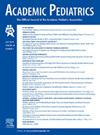住院医师专业发展轮转:整合职业探索与个人发展的创新方法。
IF 2.8
3区 医学
Q1 PEDIATRICS
引用次数: 0
摘要
目的:了解居民如何利用专业发展轮转(PDR)、其对不同专业发展领域的影响以及对职业认同形成(PIF)的潜在影响。方法:本定性研究采用半结构化、一对一的虚拟访谈,对参加第二年PDR的儿科住院医师和刚毕业的学生进行访谈。招聘通过电子邮件进行,并采用有目的的抽样策略,直到达到充分。三位研究小组成员使用Dedoose (v.8.3.41)软件对每次访谈进行审查和编码。所有作者在连续的会议上会面,使用应用主题分析来审查编码文本,直到就最终研究主题达成共识。随附的简短调查列出了人口统计、已完成的轮换组成部分和总体轮换评级。结果:22名参与者完成了研究:12名住院医生(目前是第三年)和10名最近(结论:在住院医生期间,包括个人发展方法在内的专业发展的专门轮转受到高度重视,并影响了职业规划、师友关系、个人更新感和PIF。本文章由计算机程序翻译,如有差异,请以英文原文为准。
Professional Development Rotation for Residents: An Innovative Approach to Integrating Career Exploration and Personal Development
Objective
To describe how residents utilized a professional development rotation (PDR), its influence on different domains of professional development, and potential effects on professional identity formation (PIF).
Methods
This qualitative study used semistructured, one-on-one virtual interviews with pediatric residents and recent graduates who participated in a second-year PDR. Recruitment occurred via email with a purposeful sampling strategy until sufficiency was achieved. Three study team members reviewed and coded each interview using Dedoose (v.8.3.41) software. All authors met over sequential meetings to review coded texts using applied thematic analysis until achieving consensus on final study themes. An accompanying brief survey cataloged demographics, rotation components completed, and overall rotation ratings.
Results
Twenty-two participants completed the study: 12 residents (current third year) and 10 recent (<1 year) graduates. In the survey, the majority (77%) rated the rotation more valuable than others for career development and all engaged in multiple types of activities. Five major themes emerged in thematic analysis: 1) PDR was highly valued for providing protected time; 2) meetings with mentors were particularly influential to career development and emerging identity; 3) reflecting on strengths, skills, and/or reconnecting with interests most contributed to ongoing PIF; 4) back-up call was the biggest barrier to full participation; 5) unstructured time for personal development provided the strongest sense of rejuvenation.
Conclusions
A dedicated rotation for professional development that encompassed personal development approaches was highly valued during residency and influenced career planning, mentorship connections, sense of personal renewal, and PIF.
求助全文
通过发布文献求助,成功后即可免费获取论文全文。
去求助
来源期刊

Academic Pediatrics
PEDIATRICS-
CiteScore
4.60
自引率
12.90%
发文量
300
审稿时长
60 days
期刊介绍:
Academic Pediatrics, the official journal of the Academic Pediatric Association, is a peer-reviewed publication whose purpose is to strengthen the research and educational base of academic general pediatrics. The journal provides leadership in pediatric education, research, patient care and advocacy. Content areas include pediatric education, emergency medicine, injury, abuse, behavioral pediatrics, holistic medicine, child health services and health policy,and the environment. The journal provides an active forum for the presentation of pediatric educational research in diverse settings, involving medical students, residents, fellows, and practicing professionals. The journal also emphasizes important research relating to the quality of child health care, health care policy, and the organization of child health services. It also includes systematic reviews of primary care interventions and important methodologic papers to aid research in child health and education.
 求助内容:
求助内容: 应助结果提醒方式:
应助结果提醒方式:


